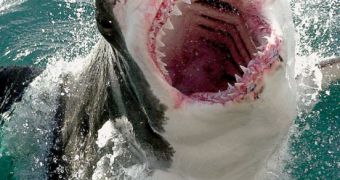According to a new investigation whose findings were published in the journal Scientific Reports, white sharks are significantly hungrier than previously estimated by wildlife researchers.
Thus, it is being said that, all things considered, a white shark can only survive on 30 kilograms (roughly 66 pounds) of meat for a period of two weeks tops. Once these two weeks are over, the shark must once again hunt and secure its next meal.
Up until now, it was believed that the aforementioned amount of meat allowed a great white to swim about unhindered and without experiencing any stomach pangs for almost 45 days.
“Our estimate of total daily energy expenditure (TDE) suggests white sharks feed far more frequently than previously estimated and does not support the proposal that white sharks could survive at energy balance on 30 kg of marine mammal blubber for 1.5 months,” the researchers write in their paper.
When comparing these previous assumptions concerning the feeding behavior of great white sharks with the findings of this new report, there is only one conclusion to draw: great white sharks are about 3-4 times hungrier than thought. Sources quote Dr. Jayson Semmens, a researcher currently working with the University of Tasmania Institute for Marine and Antarctic Studies, who wished to make the following observations:
“The energy requirements of large sharks in the wild are poorly documented and their prey intake rates are largely unknown. Research on how sharks interact with their ecosystems is needed because many shark species are highly vulnerable to overexploitation.”
“Our study uses metabolic rates derived from swimming speed estimates to suggest that feeding requirements of the white shark are much higher than previously proposed,” Dr. Jayson Semmens went on to argue.
Due to their being top predators that rarely spend much time in the same waters, white sharks are particularly difficult to study.
However, understanding their behavior is mandatory in order for scientists to be able to figure out how the dynamics of marine ecosystems work.

 14 DAY TRIAL //
14 DAY TRIAL //